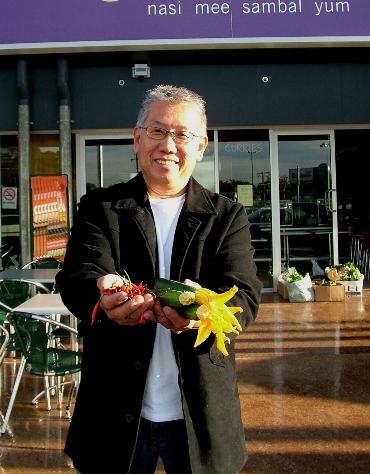Chinese are as innovative as chilli is addictive
Jimmy Shu was born in Sri Lanka about 60 years ago when it was a virtual melting pot of several continents’ flavours.
Imagine the combination of Hindu vegetarian food, exquisite curries, chillies, flavours from South-East Asia and noodles from China. It was an exciting time of discovery for young Jimmy.
Jim’s Dad, Andrew Shu, started his restaurant in Sri Lanka in 1946, just in time for Jimmy’s birth in 1949.
With Chinese parents, he was raised in this restaurant on tantalising curry and noodle dishes. Jimmy watched his dad accumulate a large “food family,” members of which regularly went on a tantalizing food journey. Menus were changed regularly to prevent boredom and customers appreciated it.
Years later, Jimmy found it easy to gather his own food family and impress them with variety and flavor from all parts of the continent, Asia and the Pacific.
Andrew Shu taught Jimmy how to be passionate about ingredients and condiments, tempting palates of patrons by romancing the chili, the noodle and curry pot.
He is proud to have been a part of changing the way people view curries and noodles in several countries, including Sri Lanka and Australia.
“I watched Dad pioneer soy bean manufacturing and noodle making, going on to operate one of the country’s most successful restaurants,” said Jimmy.
Mr Shu imported the first noodle machine into Sri Lanka.
Making 20kg of egg noodles each morning
Customers got a liking for noodle dishes and before long, the lad’s morning work included making 20 kg of real egg noodles for their restaurant, Modern Chinese Café, that was fast becoming a trend-setter.
The secret was to use just the right amount of eggs to bind the noodles, otherwise it would break apart. This daily noodle grind, far from putting the lad off food, delivered the Shu family a wide circle of friends, based on conversation and love of good food.
Jim expresses it this way: “Food has no restrictive borders. It breaks down barriers and makes people decent and tolerant. We should call this business, chefs without frontiers.”
Jimmy came to learn that the Shu family had suffered privations and economic hardships. It apparently made them innovative and people oriented, not unlike many Chinese cooks the world over.
So what hardships influenced the trainee cook?
In between cooking, his dad worked as a silk merchant for a couple of years, push-biking his cloth wares around Sri Lanka. Jimmy has memories of the gent pedalling behind the coke delivery truck, collecting the fuel that fell to the roadway when it was being unloaded to customers. This coke fuelled his restaurant at night. Andrew became well known for pioneering the manufacture of soy bean sauce, noodle manufacturing and a new dish featuring crab meat. He had the “midas touch” according to Jimmy, and deserved his success, becoming like a “food-father,” the head of a giant “food-family.” Getting opinions from customers became mandatory. Jimmy learnt to ask for feedback at an early age.
It was an excellent grounding and inspires the grateful son to this day.
Working at one of his early restaurants in Malaysia, a customer raved about a fish curry cooked by someone else, many kilometers away. Fully curious, Jimmy traveled six hours to get a taste of this dish that he described as “truly divine.” It gave him more menu ideas.
Many Chinese chefs seem innovative and we think we have discovered the reason why.
Jimmy thinks it is because they were nomads for centuries, being prepared to try anything in case it made money, which it often did.
He has a theory on this. The Chinese had influences that recent British and others missed out on.
Cruel dynasties and centuries of suffering, made nomadic and wandering Chinese very versatile. They dug deep, invented gunpowder and fireworks and made explosively hot curries.
In the food department, wandering Chinese learned to be versatile and make do with what they had. Often misunderstood, they tackled the problem by being cooking innovators, tempting with spiced dishes.
Passion with a ladle and a pot on an open fire became passion and experimentation in the kitchen. They dug deep into the world of cooking and condiments.
Excited by raw materials
Jim excitedly talks of his raw materials: “Lemongrass used to grow wild at my home in Sri Lanka but in Melbourne in 1980, lemon grass was a rare herb. I used to grab it whenever I saw it but today we have the luxury of bulk lemongrass.
“Australian lemongrass is so prolific and superior as a product that I expect the day to come when we export it back to Asia. “Then we began using another ingredient called galangal, a type of ginger.”
“I felt like a tradesmen looking for the best materials. “I discovered that migrants were prepared to grow the rice and herbs I needed to get authentic flavors,” said Jimmy.
It wasn’t always that easy however.
Passion for herbs resulted in Jimmy breaking the law while heading through Melbourne airport on a flight from Singapore 20 years ago.
Customs officers sniffed out some galangal (a type of ginger, a rhizome from the tuber family), stuffed in a pair of sneakers that Jimmy was trying to sneak through.
He was scolded and walked off with his head bowed, feeling like a food criminal.
Discovering galangal
Shortly thereafter Jimmy discovered Vietnamese gardeners with boxes of galangal they had grown in the suburb of Richmond. The herb had almost brought him undone but thanks to Vietnamese migrants, he would no longer take crazy risks.
Before Jimmy Shu migrated down under in 1974, an Australian immigration official advised: “Don’t start your restaurant until you have worked for someone else.”
It proved invaluable. For four years he followed this advice while learning the trade from the bottom to the top.
“You learn best by washing dishes. It allows you to see everything that is going on. I washed, cooked and cleaned up, always looking over my shoulder to learn how things were done,” explained Jimmy.
He worked very hard, doing three jobs and saved up enough money to start a restaurant joint partnership called Shakahari, in Lygon Street, Carlton in 1982.
After a short time they opened a second restaurant, then a third, and a fourth, until Jim had a total of eight under his belt.
Four were in Melbourne, one in Alice Springs, one in Darwin, with two in Malaysia.
People quickly voted with their feet, knives and forks
Take Melbourne’s very popular, first-ever noodle shop in Claredon Street, South Melbourne. It is not surprising that Jimmy worked there back in 1984. He developed new ideas and put them to work for patrons at his next eight restaurants.
“I was grateful that migrants are quick to come on my food journey but it doesn’t take long for the rest of the population to catch on and make our menus very popular.
Avoiding boredom in Darwin and the Alice
Darwin and Alice Springs are apparently easy places in which to get innovative. Both have large migrant populations with Asians always prepared to go on a food journey.
Jimmy named both restaurants Hanuman, with each specializing in Thai and Tandoori cuisines. Inner Brisbane has 166 food outlets offering curry and many also feature noodles. Sydney by comparison has 447 and Melbourne has reached 475.
Migrants and yuppies have helped make Australian foodies very cosmopolitan. They’ve been spoilt and now they come to expect it.
It’s not surprising that Jimmy Shu has been appointed as one of two food ambassadors for the Northern Territory.
The other official NT foodie is Athol Wark, of South African background, a bush tucker expert and senior lecturer at the Charles Darwin University in Alice Springs.
He recently returned from the USA where role of food ambassador had him promoting Australian and definitively Northern Territory produce such as barramundi fish and lobster.
Jimmy did similarly back in 2005. Exquisitely presented food gives tourists an additional reason to flock to the NT and the Government recognizes this.
Hence, tourists are getting their taste buds tantalized at the instigation of Territory officials.
Countless chefs and restaurants recycle ideas but not everyone sets the food agenda. Aussies are very welcoming of restaurants that set the agenda and refuse to blend with the furniture.
It brings palates alive and sets the tongues wagging, very necessary if you are to have food without frontiers and many overlapping food-families.




Comments
Post a Comment